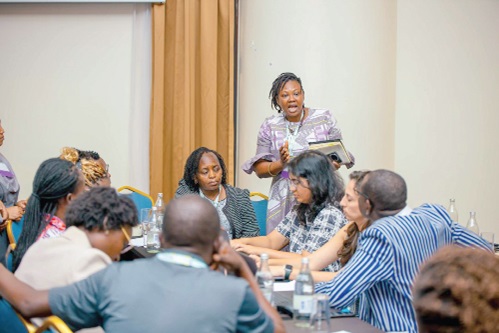
Health promotion and education take centre stage at Social and Behaviour Change meeting
In a bid to encourage pregnant women to attend Antenatal Clinic (ANC) early, the Ghana Health Service introduced pregnancy school across the country to provide relevant information on pregnancy and newborn care.
The pregnancy school is conducted in a friendly environment where a Health Promotion Officer provides information on maternal and child health, including malaria prevention, nutrition, antenatal care, safe delivery, breastfeeding, sex position, bed preparedness, family planning services, post-delivery and postpartum care.
Additionally, the school facilitates sessions that encourage positive health behaviours, such as attending regular antenatal check-ups, maintaining proper hygiene and preparing for childbirth.
The Health Promotion Officers also help expectant mothers to understand their rights to access quality maternal health services. There is also a question and answer session.
A Social and Behaviour Change Officer (SBC) of the National Malaria Elimination Programme (NMEP), Ms Muniratu Venu, made this known during a group discussion on malaria in pregnancy at the just-ended annual meeting of the Social and Behaviour Change Working Group (SBC WG) of the Roll Back Malaria (RBM) Partnership to End Malaria in Nairobi, Kenya recently.
The meeting brought together malaria SBC professionals worldwide who shared experiences, participated in skills-building sessions, discussed emerging issues and set the working group’s priorities for the coming year.
The three-day meeting, which was on the theme: “Insight to action,” attracted about 130 participants from 30 countries, including Ghana.
Ms Venu noted that in Ghana, it was observed that most pregnant women did not attend ANC early because of misconception and cultural belief that evil forces would cause the woman to miscarry.
To address the misconceptions, she said, community health workers organised house-to-house sensitisation to educate pregnant women and their families on early antenatal care and taking routine Sulphadoxine Pyrimethamine (SP) given at the ANC for the intermittent preventive treatment of malaria in pregnancy as directed by the health worker, as well as Insecticide-treated Mosquito Net (ITN) for use to prevent mosquito bite and malaria.
She said the pregnancy school was also another way of motivating pregnant women to attend ANC early, adding that the pregnancy school has helped to improve ANC attendance and the adoption of positive health behaviours across the country.
Ms Venu said previously, adolescent pregnant girls were put together with adult pregnant women but that had changed, and teenagers have their own pregnancy school dubbed ‘adolescent health corner’, manned by a midwife to make them comfortable and prevent stigmatisation.
From Rebecca Kwei,
Nairobi, Kenya
Courtesy: National Malaria
Elimination Programme
